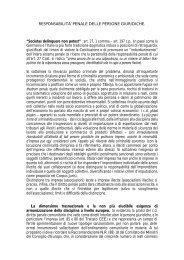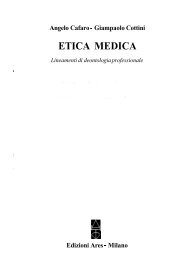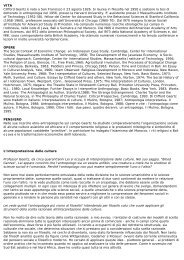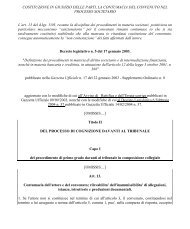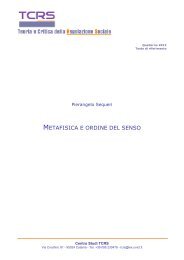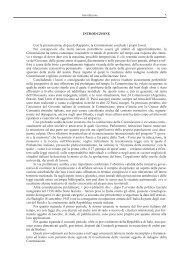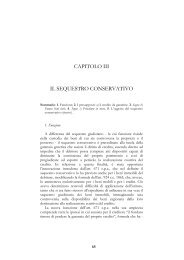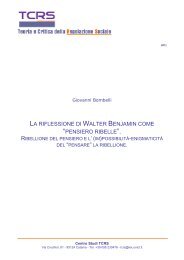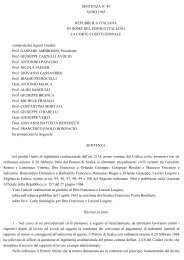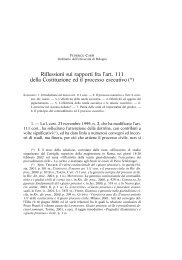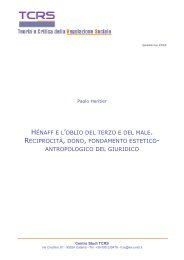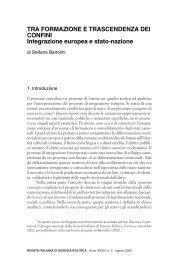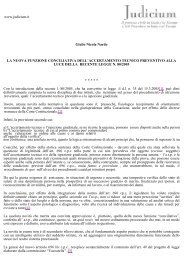FOGLI DI LAVORO per il Diritto internazionale 3 ... - Giurisprudenza
FOGLI DI LAVORO per il Diritto internazionale 3 ... - Giurisprudenza
FOGLI DI LAVORO per il Diritto internazionale 3 ... - Giurisprudenza
You also want an ePaper? Increase the reach of your titles
YUMPU automatically turns print PDFs into web optimized ePapers that Google loves.
<strong>FOGLI</strong> <strong>DI</strong> <strong>LAVORO</strong> <strong>per</strong> <strong>il</strong> <strong>Diritto</strong> <strong>internazionale</strong> 3/2008<br />
powers. It is clear that the applicant associations belong to a<br />
group of religious communities which have existed in Germany<br />
since the 1960s. Despite the fact that the applicant associations<br />
were not prohibited in all these years, the terms used by the<br />
German State agencies and in Government statements to<br />
describe the applicant associations' movement (“sect”, “youth<br />
religion”, “youth sect” and “psycho-sect”) had negative<br />
consequences for them. The adjectives “destructive” and<br />
“pseudo-religious” have also been used to describe them. This<br />
interference was not prescribed by law (Federal Constitution and<br />
Basic Law) and the Government have not submitted any proof<br />
of the assumption that these religious communities were a<br />
danger to society. Instead, the Government's statements are a<br />
clear indirect interference contrary to the obligation of neutrality<br />
required by Article 4 of the Basic Law and cannot be justified as<br />
“prescribed by law” and “necessary in a democratic society”.<br />
According to its settled case-law, the Court leaves the States<br />
Parties to the Convention a certain margin of appreciation in<br />
deciding whether and to what extent interference is necessary,<br />
but that goes hand in hand with European su<strong>per</strong>vision of both<br />
the relevant legislation and the decisions applying it. In this case<br />
there were no indications that the teachings of Osho or the<br />
methods employed by the applicant associations were contrary<br />
to the rights and freedoms of others or that public safety and<br />
public order were in danger.<br />
PARTLY <strong>DI</strong>SSENTING OPINION OF JUDGE<br />
KALAYDJIEVA<br />
I regret being unable to join the majority's view that<br />
imparting opinions, guidance or warnings on any beliefs may be<br />
seen as “a power of preventive intervention on the State's part<br />
[...] consistent with the Contracting Parties' positive obligations<br />
under Article 1 of the Convention” (paragraph 99). The very<br />
notion of a State duty to “launch a large-scale campaign<br />
designed to ... stimulate a critical discussion” and “give official<br />
warnings“ of “the potential dangers” (paragraph 8) of certain<br />
religious groups sounds fam<strong>il</strong>iar to anyone who ex<strong>per</strong>ienced<br />
such “protection” for decades.<br />
I fa<strong>il</strong> to see the active role of the State in a pluralistic society<br />
as a participant in the public discussion of beliefs. In the absence<br />
211



